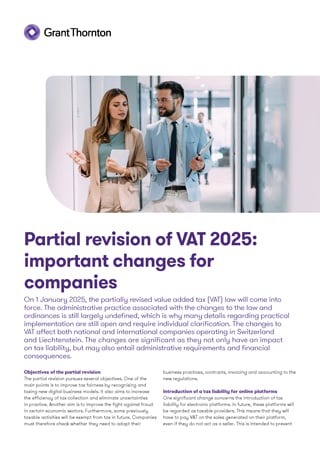
Objectives of the partial revision
The partial revision pursues several objectives. One of the main points is to improve tax fairness by recognising and taxing new digital business models. It also aims to increase the efficiency of tax collection and eliminate uncertainties in practice. Another aim is to improve the fight against fraud in certain economic sectors. Furthermore, some previously taxable activities will be exempt from tax in future. Companies must therefore check whether they need to adapt their business practices, contracts, invoicing and accounting to the new regulations.
Introduction of a tax liability for online platforms
One significant change concerns the introduction of tax liability for electronic platforms. In future, these platforms will be regarded as taxable providers. This means that they will have to pay VAT on the sales generated on their platform, even if they do not act as a seller. This is intended to prevent sales via digital platforms from remaining untaxed. Strict administrative measures are planned if platforms do not register, such as import bans, destruction of consignments or public naming of affected platforms.
General reverse charge VAT liability for the transfer of emission allowances
The reverse charge tax liability will be extended to trading in emission allowances. In future, the sale of emission allowances and similar certificates to domestic companies will be subject to reverse charge VAT, even if the seller is registered for VAT in Switzerland or Liechtenstein.
Subsidies and public authorities
One significant change concerns subsidies: If a local authority designates funds paid out as a subsidy, these are now automatically deemed to be such within the meaning of VAT law. This is intended to create more legal certainty for local authorities and subsidy recipients. However, such benefits granted by the public sector can still qualify as a subsidy, even if they are not explicitly labelled as such. Technical assessments are therefore still necessary. Abuse of the term subsidy is of course excluded.
Travel agencies and tour operators
The invoicing of services provided by travel agencies and tour operators will also be adjusted. According to the new regulation, foreign travel agencies and tour operators no longer have to register. The place of supply principle now generally applies to travel services provided by travel agencies in their own name. There is no right to deduct input tax on services purchased in Switzerland. Domestic travel agencies and tour operators no longer have to pay tax on travel services provided in their own name. If they provide travel to and abroad in their own name, they are entitled to deduct Swiss input tax.
Place of performance for event organisation
In future, services provided by event organisers will be taxable at the recipient›s location. This reflects the nature of these services better, which often include conceptual or administrative elements. However, the place-of-receipt principle does not apply if a different place of supply is defined for services provided or charged onwards, for example in the case of catering services, accommodation services or transport services.
Place of performance for certain streaming services
The place of supply for streaming services in the areas of culture, arts, sport, science, education and entertainment is now determined at the recipient›s registered office, which may result in a tax liability for foreign companies. However, if services in these areas are provided locally to physically present persons, the place of supply remains where the activities are actually carried out.
Further adjustments
The partial revision also contains further adjustments, such as the clarification of existing regulations and new exemptions. The VAT rates were already increased on 1 January 2024 (standard rate 8.1 %, reduced rate 2.6 %, special rate 3.8 %). In addition, from 1 January 2025, registration for VAT and the declaration of VAT will only be possible via the electronic portal of the Federal Tax Administration (e-portal), as the transition period ends on 31 December 2024.
Relevance for companies
The changes to the partial VAT revision have a significant administrative and financial impact on companies operating in areas such as online platforms, travel agencies and emissions trading. Affected companies should therefore review their tax obligations and their impact on their business processes, contract design and accounting systems and make any necessary adjustments. Public authorities are also affected by the new regulations on subsidies.
The partially revised VAT law comes into force on 1 January 2025. As many practical questions regarding implementation are still unclear, case-specific clarification is essential and helps to plan the necessary steps. Grant Thornton Switzerland and Liechtenstein will be happy to provide you with further information and advice on the partial VAT revision.


